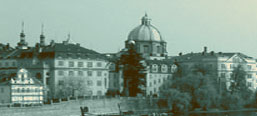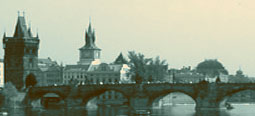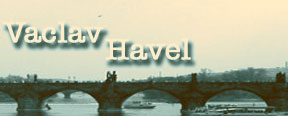Acceptance
Address
Honorary
Degree from The University of Michigan
Ann Arbor, USA
September
5, 2000
Mr. President,
Distinguished guests,
Your
University was founded in the same year in which my country
witnessed the discovery of the alleged medieval manuscripts
of patriotic epics which purported to attest the ancient
roots of our nation's culture; the wealth of its history;
and, the greatness of its mythmaking creativity. Their appearance
gave a boost to our self-awareness and self-confidence as
a nation at a time when we were deprived of freedom and
they were designed to contribute toward our emancipation.
Professor
Masaryk, before becoming the first Czechoslovak President,
collected evidence proving that these manuscripts - although
superbly written, and obviously inspired by good intention
- were fakes.
There
ensued a so-called "Battle for the Manuscripts"
- a period of major importance in Czech history. The minority
who insisted that the papers had been forged were decried,
by majority opinion, as traitors to the nation and accused
that, by questioning the most precious relics of the Czech
people, they undermined the nation's self-confidence and,
thus, jeopardized the entire self-liberation effort. Rejection
of the manuscripts' authenticity entailed a great personal
risk and a complete loss of confidence in the eyes of the
patriotic public.
Masaryk,
who was already engaged in politics at that time, would
not yield and did not succumb to the temptation to appear
complaisant to the crowds. Undeterred by the risk of losing
prestige, reputation and popularity, he stood by his conviction.
He found it unacceptable, as a matter of principle, that
awareness of national identity or the struggle for his people's
legitimate rights - first within the formation of the Austro-Hungarian
state and later with the aim of restoring Czech Statehood
- should be based on a lie or fraud. To him, the only valid
and viable cornerstone for his nation's new existence was
truth.
But what
is truth?
We now
live in the age of an information revolution when hundreds
of thousands, or millions, of pieces of information crisscross
the globe every second at a frantic speed, spanning our
planet with an all-embracing coat of communication. This
is undoubtedly a marvelous achievement to which I have no
objection whatsoever. However, it seems to me - especially
after this global breakthrough in the field of information
- that it is of paramount importance to understand the fine
difference between information and truth. I am neither the
first, nor the last, person in my country to point this
out, although I may be the first Czech who has the honor
to do so on such an important occasion before this University,
and who has had an opportunity to personally explain his
thoughts on this point to Bill Gates.
So where
is the difference between information and truth?
To put it briefly and simply, I believe that truth is also
information but, at the same time, it is something greater.
Truth - like any other information - is information which
has been clearly proved, or affirmed, or verified within
a certain system of coordinates or paradigms, or which is
simply convincing; but it is more than that: it is information
avouched by a human being with his or her whole existence,
with his or her reputation and name, with his or her honor.
I do not know how many of the millions of information details
which float around our planet meet this criterion.
It was
certainly true of the information that our famous national
manuscripts were forgeries - information which was not only
proved scientifically, but also vouched for by a great man
who stood by that information with his entire being and
who did not hesitate to fight for it - against all - and
to risk almost everything in the process. The same man later
emerged as one of the most eminent personages amongst the
creators of our modern history.
Masaryk's unswerving adherence to truth - regardless of
the cost - eventually bore historic fruit. His emphasis
on truth was embraced as one of the underlying ideals of
our modern State and Masaryk himself won universal respect
as the liberator of our nation and, as the first Czechoslovak
President, became an object of veneration.
But none
of those were a certainty. Masaryk could have been completely
obliterated and forgotten simply because he went against
the trend of his time. In any event, the nation would have
eventually recognized that the manuscripts were fakes. As
far as my contemporaries are concerned, I suspect that the
majority do not care in the least whether those epics were
authentic or forged; many may not even know of their existence.
Nevertheless, Masaryk's attitude demonstrates that genuine
commitment to truth means standing firm no matter whether
it yields returns or not; whether it meets with universal
recognition or universal condemnation; whether a fight for
truth leads to success or to absolute scorn and to obscurity.
President Kennedy dwelt upon this subject in his book Profiles
in Courage - a work portraying the fate of people who were
not afraid to stand up alone against all and to risk political
defeat because they were certain of their truth and obeyed
their conscience.
Why am
I speaking about this here and now? Graduates of your University
will soon become leading figures in various spheres of American
public life. I would wish for them, as well as for myself,
that they manage to remain faithful to truth in this information
age and that they work in this spirit; in the hope, perhaps
a foolish hope, that they will make the world a better place.
Masaryk's hope may have appeared foolish as well. But was
it really? Is it foolish to let ourselves be guided by conscience,
to insist on the truth even when it is out of favor and,
thus, to affirm that truth is genuine truth, in the deepest
sense? What is foolish, actually?
Mr. President,
Ladies and gentlemen,
I thank you with all my heart for the honor which you have
awarded me today. I hope that I will not disappoint your
trust.
Thank
you.


